










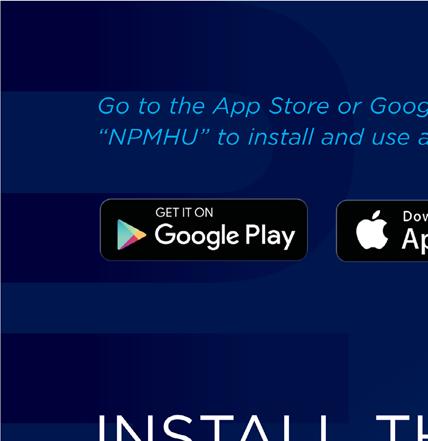












































































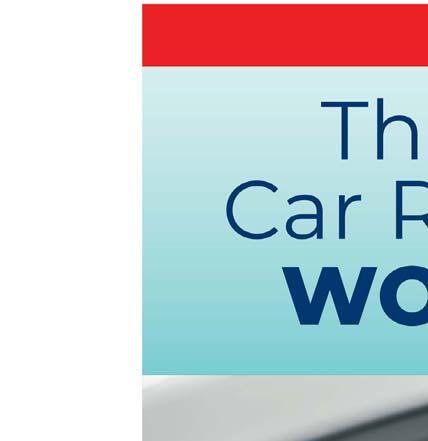













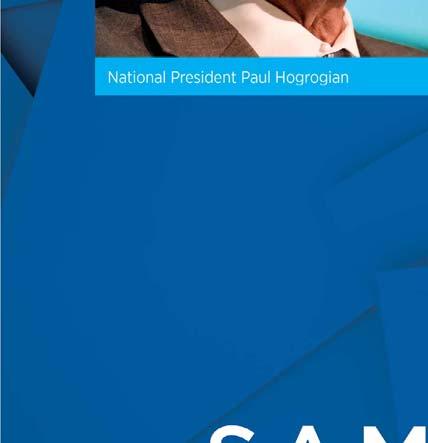


















































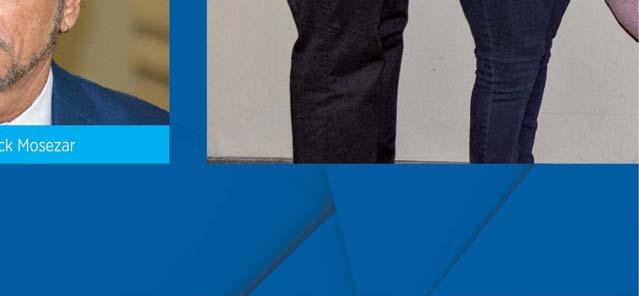


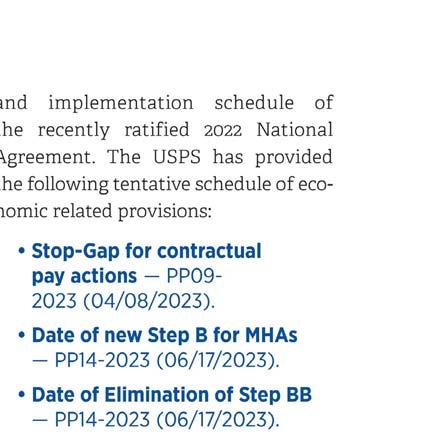




































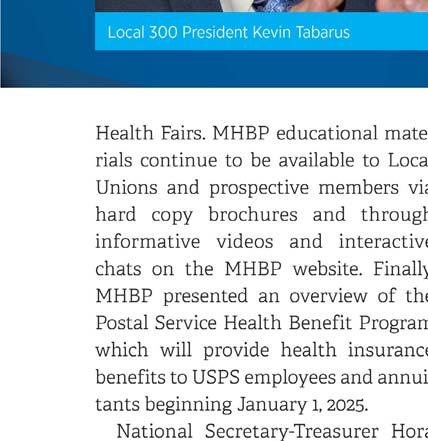


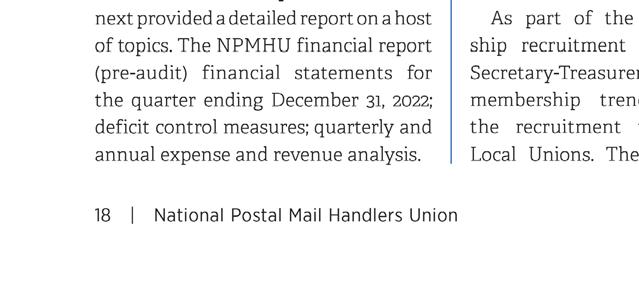































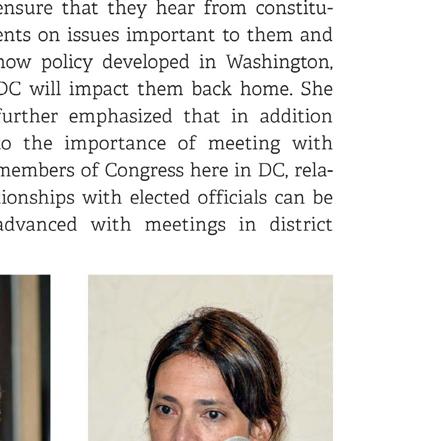










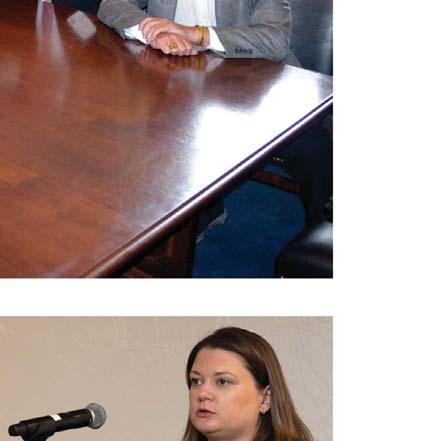









































































































































































































































































































PACkie awards are accolades of recognition highlighting a Local’s commitment to the success of the NPMHU Political Action Committee. The winners exemplify excellence amongst our NPMHU locals.





LEVELDONATIONAWARD
Member$26($1perpayperiod)PACPin
Sponsor$52($2perpayperiod)PACBeanie

Activist$100PACPoloShirt

Leader$250PACTravelBag


Ambassador$500PACCoolerandBottleOpener
SuperAmbassador$1o00AllIncentiveGifts
There is a quick way for Mail Handlers to contribute to the NPMHU PAC. Simply call in to the PostalEASE system, or visit the PostalEASE option on the web at www.liteblue.usps.gov. Follow the instructions printed on pages 27 and 28 of this magazine. Your PAC contribution will be made directly from your bi-weekly postal payroll. You also have the option of sending in a personal check or authorizing a credit card contribution. Your contributions will also be entered in to the incentive award program that entitles you to an award based on your contribution level. There are six distinct PAC membership levels and awards. Awards are distributed based on membership level and will be mailed after the end of the year; awards will vary year to year.
Contributions to the Mail Handlers PAC are not deductible as charitable contributions for purposes of federal income taxes. In addition, federal law requires that the Mail Handlers PAC report to the Federal Election Commission the name, mailing address, occupation, and name of employer for each individual whose contributions in any calendar year total in excess of $200. Please also note that the Mail Handlers PAC has political purposes, and that all members have the right to refuse to contribute, and the right to revoke their authorization for any continuing contributions, without any reprisal.
YoucancontributedirectlytotheMailHandlersPACbyfillingoutthefollowinginformationandmailingitto:
Mail Handler PAC
P.O.Box65171
WashingtonDC20035
Please enclose your check or money order, or provide authorization to charge your credit card.
(Cut here and return to NPMHU PAC)
This is to certify that I, _________________________________________________________, have voluntarily contributed the amount listed below, to the NPMHU PAC. I understand that this voluntary contribution is not a condition of membership in the union; I have the right to refuse to contribute without any reprisal; if specific contribution amounts are mentioned they are merely suggestions and I am free to contribute more or less; the Union will not favor or disadvantage me because of the amount of my contribution or my decision not to contribute; NPMHU PAC will use the money it receives to make Political expenditures and contributions in connection with federal elections; and only U.S. Citizens and lawful permanent U.S. residents are eligible to contribute.
Address_____________________________________________________________________Local__________________
Employer (if other than USPS)____________________________ Job Title___________________________________
Contribution Amount: (Please check one):
$26 (Member) $52 (Sponsor) $100 (Activist) $250 (Leader) $500 (Ambassador)
$1000 (Super Ambassador)_____________________________ Other____________________________________
Please enclose your check or money order, or authorization to charge your credit card.
VISA MASTERCARDAcct.#______________________________________
Signature_______________________________________________Expiration Date_____________________________
ContributionstotheNPMHUPACarenotdeductibleascharitablecontributionsforfederalincomepurposes.
1. Dial 1-877-4PS-EASE—(877-477-3273) and follow the prompt for the Employee Services Main Menu.
2. When prompted, press #1 for PostalEASE
To initiate your bi-weekly PAC contribution on the web, simply go to www.liteblue.usps.gov
3. When prompted, enter your eight-digit USPS employee identification number.
4. When prompted again, enter your USPS PIN number. (This is the same as the PIN number you use for telephone bidding and/or other payroll allotments.)
5. When prompted, choose option #2 (to select payroll allotments)
6. Then choose option #1 (to select allotments)
7. When prompted, press #2 to continue
8. When prompted, press #3 to add the allotment
9. When prompted for the routing number, enter 054001220
10. When prompted for the account number, enter the following: 11260001 __ __ __—__ __—__ __ __ __ (the last nine digits of your account number is your social security number—this information will allow us to identify you as the PAC contributor).
11. Press #1 if correct
12. When prompted, press #1 for “checking”
13. When prompted, input the bi-weekly dollar amount of your PAC allotment.
14. Press #1 if correct
15. When prompted, press #1 to process
16. You will be provided a confirmation number as well as the start date for the salary allotment.
17. For your records:
· Record the confirmation number
· Record the start date of the salary allotment
18. Press #1 to repeat, or press #9 to end call
1. Enter your eight-digit USPS Employee ID Number and your USPS PIN
2. Follow the link to PostalEASE— you will again be asked to enter your Employee ID Number and USPS PIN
3. Follow the link for PAYROLL – Allotments/NTB
4. Continue to the ALLOTMENTS section
5. Your ROUTING TRANSIT NUMBER is: 054001220
6. Your ACCOUNT # will be: 11260001 __ __ __—__ __ —__ __ __ __ (the last nine digits of your account number is your social security number—this information will allow us to identify you as the PAC contributor).
7. For ACCOUNT TYPE— please select “CHECKING”
8. When prompted, please input the AMOUNT that you would like to contribute to the PAC each pay period.
9. To process your PAC allotment, you will need to select the VALIDATE button, and to finalize the transaction, please select SUBMIT. Be sure to print out a copy of the confirmation page for your records.
can make your PAC
bi-weekly
After more than a decade of hard work, the National Postal Mail Handlers Union helped to usher in the Postal Service Reform Act (PSRA) of 2022 (P.L. 117-108). Following the financial ramifications implemented by the 2006 Postal Accountability and Enhancement Act (P.L. 108-435), the PSRA is able to right the Postal Service’s fiscal ship. The law repeal the mandate to prefund retiree healthcare costs; integrate future retirees into Medicare to reduce the USPS liability on retiree healthcare costs; requires reports from USPS to Congress and the Postal Regulatory Commission on costs and performance standards; creates a public dashboard to inform customers on delays; codifies 6-day delivery to businesses and residences; and, allows for agreements between USPS and state, local and tribal governments to provide property and services. The law received strong bipartisan support in both the House and the Senate, passing 342-92 and 79-19 a month apart. The NPMHU, along with the other postal unions and stakeholders, worked on this legislation for years in order to obtain consensus. Going into the 118 th Congress, NPMHU’s legislative agenda will focus on ensuring the Postal Service and the Office of Personnel Management will
fully implement PSRA. Additionally, the Union will look to continue to improve the Postal Service’s finances, growing postal revenue, protecting service standards for customers, defending earned retirement and healthcare benefits, promoting workers’ rights, and strengthening American elections.
While the PSRA gained wide bipartisan support and passed in both the House and Senate, it only provides the first steps in improving the Postal Service.
The NPMHU will continue to work with members of the House and Senate to draft bipartisan legislation that further enforces sustainability and protects the workforce. These measures should include:
• Utilize postal-only assumptions for calculating pension liabilities.
• The USPS Office of Inspector General reported in 2013 that this recalculation would reduce liabilities with the Civil Service Retirement System (CSRS) by $1.3 billion while the Federal Employees Retirement System (FERS) would see a reduction of $9.5 billion in liabilities.
• Provide for certain index fund investments for the Retiree Health Benefits Fund, rather
than restricting the Fund to low-yielding Treasury bonds.
• Nonpostal services to grow revenue.
• The USPS Shipping Equity Act (H.R. 3287/S. 1663) introduced in the 117th Congress called to allow the shipment of alcoholic beverages directly between licensed producer and retailers to the consumer. The USPS estimated this would generate over $50 million annually.
• Currently, the USPS has the authority to expand nonbanking financial services, providing ATMs, check cashing, bill pay, and expanded wire transfers and money orders. In a 2015 report from the USPS Office of the Inspector General, after a 5-year ramp-up, these expansions could generate $1 billion annually.
Within the first months of his appointment, Postmaster General Louis DeJoy developed a ten-year plan, Delivering for America, in an attempt to set a path of financial stability and modernization. Within the plan, the delivery window is expanded from 2–3 days to 2–5 days, relying on surface transportation over air, as
well as restructuring the overall network. The information the NPMHU has received from the Postal Service on this restructuring has been high on concept, but extremely low on details. The plans are fluid and constantly changing. It is NPMHU’s concern that these changes do nothing but undermine the work of dedicated employees, negatively impact services, and drive away customers. The NPMHU asks lawmakers to work with us to fight against closures, consolidations, and subcontracting brought on by this “plan.”
Members of Congress should continue to protect the basic fundamentals of the Postal Service, ensuring that every American household and business, in urban, suburban, and rural areas, has access to the universal service provided by the USPS. The NPMHU endorses resolutions introduced by Members of the House and Senate that express the need to ensure that the Postal Service remains a public entity that can ensure delivery.
• Expressing the sense that Congress should take all appropriate measures to ensure that the Postal Service remains an independent establishment of the Federal Government and is not subject to privatization.
• Expressing the sense that the Postal Service should take all appropriate measures to ensure the continuation of door delivery for all business and residential customers.
In January 2023, Treasury Secretary Janet Yellen stated the US reached its debt ceiling and extraordinary
measures to meet debt obligations will expire in June 2023. In 2011, under similar circumstances, the House and Senate passed legislation impacting the benefits of future postal and federal employees. The NPMHU is concerned that the House and Senate will once again target postal employees as a means to reduce federal spending, and will go after the following:
• Increasing all FERS employees’ retirement contributions to 4.4 percent of salary;
• Utilizing a defined contribution retirement plan instead of the current defined benefit;
• Moving from a high-3 to a high-5 for retirement annuity calculations;
• Eliminating FERS Cost of Living Adjustment (COLA) and reducing CSRS COLAs by 0.5%;
• Eliminating the FERS retirement supplement plan for those who retire before the age of 62; and,
• Reducing the G-Fund interest rates for those under the Thrift Savings Plan.
In addition to protecting these benefits, the NPMHU will work with lawmakers to strengthen retirement benefits. These measures include:
• The elimination or curtailing of the Government Pension Offset (GPO) and the Windfall Elimination Provision (WEP).
• In the 117th Congress, the Social Security Fairness Act (H.R. 82/S. 1302), called to repeal both GPO and WEP.
• In the 117th congress, the Equal Treatment of Public Servants Act (H.R. 5834), provided for a $100 rebate to those first eligible for WEP benefits before 2022; those impacted by WEP who are eligible for benefits between 2022–2060 would
be subject either to a new formula or the current WEP formula, whichever is more beneficial; and those eligible for benefits in 2061 would be subject to a new formula.
• In the 117th, the Public Servants Protection and Fairness Act (H.R. 2337), recalculated Social Security benefits for public workers to ensure they get are not negatively impacted by the Windfall Elimination Provision
• Providing temporary employees hired after January 1989 with the opportunity to make additional contributions to their retirement plans, allowing eligible employees to retire on time with full retirement benefits.
• The Federal Retirement Fairness Act (H.R. 4268) in the 117th Congress addressed this issue.
• Create parity between CSRS and FERS retirees by providing the same COLA for both sets of retirees.
• Currently, CSRS retirees receive a COLA that is in line with the change in the consumer price index for workers, however, FERS retirees are subject to a different calculation that is often lower than their CSRS counterparts.
• The Equal COLA Act (H.R. 866) would ensure all postal retirees would receive the same COLA every year.
Over the past few years, there has been continued support from the American public on workers’ rights to unionize, seen in a Gallup poll where 71 percent of Americans are in favor of union. Reflecting this support, the House of Representatives already introduced the bipartisan
Richard L. Trumka Protecting the Right to Organize Act (H.R. 20), and there is an identical bill in the Senate (S. 567). These bills call to strengthen current federal laws by allowing private-sector workers to organize and join a union and bargain for better wages and benefits. Additionally, in the 117 th Congress, the House and Senate introduced the Public Service Freedom to Negotiate Act (H.R. 5727), requiring public employers to recognize employees’ rights to join a union and collectively bargain over wages, hours, working conditions, and allowing workers to access arbitration and mediation as a means of dispute resolution. The NPMHU will continue to advocate on these issues going into the 118th
Despite the growth of production over the past years, American wages continue to fall behind and the federal minimum wage remains outpaced by inflation. Many states and localities have already passed laws increasing minimum wage to $15.000 an hour by 2025 and the National Employment Law Project estimates that 40 percent of the American workforce will be covered by a $15.00 an hour pay base by 2026. In the 117th Congress, the Raise the Wage Act (H.R. 603/S. 53) called to increase federal minimum wage to $15.00 an hour by 2025, with gradual increases over a fiveyear period. The NPMHU will work to ensure this legislation is reintroduced in the 118th Congress.
The NPMHU will also work with our brothers and sisters in LiUNA to protect prevailing wage laws, especially those under the Service Contract Act.
Following the success of vote by mail initiatives in the 2020 elections, the 2022 midterm elections saw continued success. In the November 2022 general election, the Postal Service delivered

over 54.4 million ballots between voters and local election boards. The Postal Service delivered 98.96% of ballots within 3 days and 99.82% of ballots within 5 days. In order for this success to occur, constant communication between USPS, postal unions and management associations, and state and local election boards was necessary. These efforts prove that vote by mail is a secure and reliable way for eligible voters to participate in the democratic process. The NPMHU will promote legislation, primarily at the state and local level, to encourage democratic
participation through vote by mail initiatives, and will support such efforts at the federal level as well.
The NPMHU will take all reasonable steps to ensure that mail handlers and their families are actively involved in upcoming elections, through voter registration and education efforts to increase turn-out. It is critical that all Mail Handlers and their families not only are registered to vote, but that they go to the polls to have their voices heard. We must continue to work to ensure that pro-union, pro-worker candidates are elected to represent our interests.
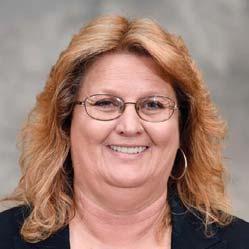
In this issue, I want to share some important dates associated with the implementation of the 2022 National Agreement as well as give a brief overview on a current Supreme Court case that could have some impact on postal employees.
As you know, the 2022 National Agreement was ratified on March 13, 2023. After ratification, dates have to be determined on when certain things can occur. Most of the dates are determined by how long it takes for the Postal Service to write or change their computer programs. The following are the implementation/effective dates for various sections of the 2022 National Agreement.
• Non-Economic Issues/Work Rules — April 8, 2023
• One Time Conversions for MHAs in 200 work year offices with a relative standing date prior to 2.5 years from the ratification date (March 13, 2023) of the 2022 National Agreement — May 6, 2023
• New wage rate which will reflect the November 2022 general wage increase and the March 2023 COLA — PP09-2023 (04/08/2023).
• Date of new Step B for MHAs — PP14-2023 (06/17/2023)
• Date of Elimination of Step BB — PP14-2023 (06/17/2023).
• Date that step waiting period will be changed to 48 weeks — PP14-2023 (06/17/2023).
• MHA Automatic Conversions/Step Changes/ Employee Classification of MHAs in 200 work year offices who have reached 24 months of relative standing — PP14-2023 (06/17/2023).
• Date of Advanced Annual leave for eligible MHAs and PTFs — PP 14- 2023 (06/17/2023)
• Retro Pay — Pay Period 19, check dated 9/15/2023
• Clothing Allotment Carryover — Is still to be determined.
On Tuesday April 18, 2023, the U.S. Supreme Court heard oral argument in the lawsuit Groff v. DeJoy. The case was brought by Gerald Groff, who delivered mail as a Rural Carrier Associate (RCA) from 2012 to 2019 in central Pennsylvania. Groff is a Christian who observes Sunday as the Sabbath, so he was not available to work on Sundays.
When Groff started as an RCA, no mail was delivered on Sunday, so Groff’s observance of a Sunday Sabbath did not pose any issue. In 2013, however, the Postal Service and Amazon agreed to Sunday delivery of certain packages. The schedule for Sunday work is governed by an MOU, which is intended to ensure an equitable rotation of Sunday work. Citing his religious beliefs, Groff consistently refused to work on Sundays. For several years, Groff and the Postal Service attempted to find workarounds, such as having volunteers take over his Sunday slots. Eventually, however, the Postal Service began disciplining Groff for his refusal to work on Sundays, and in 2019, Groff resigned.
After resigning, Groff sued the Postal Service. He argued that under Title VII of the Civil Rights Act, the Postal Service was required to reasonably accommodate his religious beliefs by exempting him from Sunday work.
After the lower courts found in favor of the Postal Service, Groff appealed the case to the Supreme Court. Back in 1977, the Supreme Court held in Trans World Airlines, Inc. v. Hardison that an employer does not need to accommodate an employee’s religious practices if making the accommodation would create an “undue hardship.” The Supreme Court also said in Hardison that it would be an “undue hardship” if an employer had “to bear more than a de minimis cost” to make the accommodation. Groff argued in his appeal that the Supreme Court should overrule Hardison and require employers to accommodate religious beliefs even if doing so created a higher cost. Groff also argued that an employer should not be able to show an “undue burden” simply by showing that coworkers are burdened by the accommodation. For instance, Groff argued, the Postal Service should not be able to show that Groff’s request created an “undue burden” on the Postal
Service overall, even if his coworkers were inconvenienced by having to work extra Sunday shifts.
Amicus briefs may be filed by parties with a strong interest in the subject matter of a case, but who are not a party to or directly involved with the litigation, especially in Supreme Court cases. An amicus brief is normally aimed at trying to protect the interest of parties whose interests are potentially jeopardized by the litigation.
In this case, the National Postal Mail Handlers Union, National Rural Letter Carriers Association, and National Association of Letter Carriers filed a joint amicus brief in support of the Postal Service with the Supreme Court making two arguments. First, we argued that the Court should not overrule Hardison, but should clarify that Hardison — read in its entirety — requires the employer to accommodate religious exercise unless doing so would create substantial costs. We argued that this would allow employers to better balance the needs of religious employees with the needs of the business as a whole. Second, we argued instead of deciding in the abstract whether a burden on a coworkers can create an “undue burden” for the employer, the Court should send the case back to the lower courts to investigate the facts on how Groff’s scheduling request would affect the Postal Service and his coworkers. We argued that the Court simply did not yet have enough facts to make that decision. We also argued that it would be an “undue burden” if the Postal Service had to violate a CBA or MOU provision to accommodate Groff.
The Supreme Court heard oral argument in the case on April 18, 2023. It is often difficult to make predictions about Supreme Court decisions, but based on the questions the justices asked at the oral argument, there is some hope that the Supreme Court may rule along the lines that our amicus brief suggested. A majority of the justices seemed to agree with the Postal Service and the postal unions that Hardison should not be overruled, but should be clarified. Additionally, a majority of the justices indicated that the case should be sent back to the trial court to find more facts about the effects of excusing Groff from Sunday work before determining whether the Postal Service violated Groff’s religious rights.
Importantly, at oral argument, Groff’s lawyer agreed that it would be an “undue burden” to excuse Groff from Sunday work if doing so would violate a seniority system in a collective bargaining agreement. So, it appears that seniority systems, like the system set forth in the NPMHU National Agreement, are unlikely to be affected by Groff’s lawsuit. It remains unclear whether other provisions of the National Agreement — like fair-scheduling provisions — will be treated like seniority systems. The Supreme Court is expected to issue its decision by the end of June.
The NPMHU supports employees’ rights to receive reasonable accommodations for their religious beliefs and practices, and will continue to urge the Postal Service to provide those accommodations consistent with the terms of the National Agreement.
If you have any questions about the implementation dates or the Supreme Court case, please talk to your union official.


Swelling in the body can happen for many reasons. Summer heat can cause your arms or legs to swell if you’ve been sitting or standing for a while. Body parts can also swell from overuse or an injury. But sometimes, swelling is a sign of an underlying medical condition.

More than half your body is made of water. Much of it flows around in your bloodstream. Water also makes up a lesser-known fluid called lymph. Lymph travels through the lymphatic system, which is made up of the tissues and organs that produce, store, and carry immune cells.
When your body fluids build up in one place, it can lead to swelling. This is called edema. You can get edema anywhere in your body—your feet, legs, ankles, hands, or even face. It can appear in one place or in many body parts at the same time.
Sometimes it’s only temporary. Pregnancy can lead to swelling in the legs and ankles from the pressure of the baby. Eating too much salt can cause you to retain water. So can certain medications, like some used for high blood pressure.
“Edema can cause problems with moving around, discomfort, infections, and difficulty with wound healing,” says Dr. Dhruv Singhal, a surgeon who treats lymph system problems at Harvard University. “So any kind of swelling should be looked at by a health care provider.”
Edema may be a sign of a serious medical condition. A dangerous type of blood clot called a deep vein thrombosis, or DVT, can cause sudden edema. Heart, liver, or kidney problems can also lead to swelling.
In a disease called congestive heart failure, the heart has problems pumping blood around the body. This can cause fluid to pool in the legs. With liver or kidney damage, fluid can’t pass through them quickly and can build up in the limbs.
Trauma to the body can also trigger edema. Singhal treats a type of edema caused by damage to the lymphatic system. This is called lymphedema. In the U.S., lymphedema is most often caused by cancer surgery.
Treatment for edema depends on the cause. If the swelling is caused by a drug, switching to a different type of medication may help. People with edema caused by a blood clot usually receive a blood thinner to break up the clot. Drugs called diuretics may be used for conditions like heart failure. These help your body get rid of excess fluid.
“We also have certain treatments that almost all patients get, no matter what the cause of their edema is,” Singhal says. These include compression garments: stockings, sleeves, or gloves that help reduce swelling. They can help reduce discomfort even if the cause of edema is something that can’t be treated.
If you experience sudden swelling in one or more limbs, or minor swelling that’s getting worse over time, see a health care provider right away. Early treatment for many types of swelling can reduce symptoms in the long term, Singhal explains. Help reduce discomfort from swelling:
• Wear loose clothing and shoes that aren’t too tight.
• Prop up swollen legs.
• Exercise gently.
• Limit salt in your diet.
• Take medications as prescribed.
If you have a health concern or need advice on what to do and where to go, MHBP offers a 24/7 Nurse Line, call 800-556-1555. If you have any questions or would like more information, please call MHBP at 800-410-7778.
Sources: National Institutes of Health: https://newsinhealth.nih.gov/ | MHBP.com
The MHBP Consumer Option is a high-deductible health plan with a health savings account (HSA). The plan will deposit up to $2,400 per year for a Self and Family or Self Plus One enrollment ($1,200 Self Only) into your HSA for you. Use it to pay for health expenses, or watch your savings grow as they roll over. It’s up to you.

Network preventive care is covered at 100% with no deductible. After you meet your deductible, you pay low copayments – or nothing at all – for covered care.
CONSUMER OPTION BENEFITS INCLUDE: *
• No out-of-pocket costs for maternity care
• No cost for telehealth through Teladoc Health®
• No-cost MinuteClinic® services at a CVS Pharmacy® location**
• 40 alternative care visits per year for chiropractic care and acupuncture
• No cost for Lab Savings Program
2023
The plan gives you both comprehensive medical coverage and a Health Savings Account (HSA).
Federal Employee Biweekly Premiums
Self $ 78.69
Self plus One $174.14
Family $182.85
These rates do not apply to all enrollees. If you are in a special enrollment category, please refer to the FEHB Program website or contact the agency or Tribal Employer that maintains your health benefits enrollment.
CONNECT WITH MHBP
Call 1-800-410-7778 (TTY: 711) 24 hours a day, 7 days a week (except major holidays).
Or visit MHBP.com to schedule a one-on-one phone consultation, start a live chat, register to attend a webinar or learn more about MHBP plans.
Consumer Option members must meet their deductible before benefits apply. Includes select MinuteClinic services. Not all MinuteClinic services are covered. Please consult benefit documents to confirm which services are included. However, such services are covered at negotiated contract rates. This benefit is not available in all states. Aetna® and MinuteClinic, LLC (which either operates or provides certain management support services to MinuteClinicbranded walk-in clinics) are part of the CVS Health® family of companies. Aetna is the brand name for products and services provided by one or more of the Aetna group of companies, including Aetna Life Insurance Company and its affiliates (Aetna).
Teladoc Health® and Teladoc physicians are independent contractors and are not agents of Aetna. Visit Teladoc.com/Aetna for a complete description of the limitations of Teladoc Health services. Teladoc, Teladoc Health and the Teladoc Health logo are registered trademarks of Teladoc Health, Inc.
are subject to the definitions, limitations and exclusions set forth in the 2023 official Plan Brochure.
©2023 Aetna Inc. All rights reserved. All other names and (registered) trademarks are the property of their respective owners. 1003700-01-01
Part health plan, part savings account that’s there when you need it.
This is a summary of the MHBP Consumer Option plan. Before making the final decision, please read the 2023 official Plan Brochure (RI 71-016). All benefits


USPS EMPLOYEES
The Postal Service Reform Act of 2022 (PSRA) was signed into law in April 2022. Since then, the Office of Personnel Management (OPM), in conjunction with the Postal Service, has been working to implement a new Postal Service Health Benefits (PSHB) Program, as required under the new law. PSHB is a new, separate program within the Federal Employees Health Benefits (FEHB) Program and will be administered by OPM. Coverage under the PSHB Program will be effective January 1, 2025. Below is a list of facts regarding the PSHB Program for active employees:
1.You are required to select a health insurance plan in the PSHB Program during the 2024 open season period, from November 11, 2024 – December 9, 2024.
2.PSHB plan options and premium information will be available in October 2024.
3.OPM will launch a new enrollment platform for health insurance. Information on how to make elections using the new system will be available prior to the 2024 open season.
4.If you are an active employee age 64 or older as of January 1, 2025, you ARE NOT required to enroll in Medicare Part B to continue your PSHB health insurance coverage once you retire. However, upon your retirement and entitlement to Medicare Part A (typically at age 65), you will have the option to enroll in Medicare Part B during a special enrollment period.
If you are the primary subscriber, your covered family members will not be required to enroll in Medicare Part B to stay on your PSHB plan; however, enrollment in Medicare Part B may reduce your overall costs for health care-related expenses and may provide better value for you and your family.
5.If you are an active employee under the age of 64 as of January 1, 2025, to continue your PSHB health insurance coverage in retirement, you WILL BE required to enroll in Medicare Part B after you retire and become entitled to Medicare Part A (typically at age 65).
If you are the primary PSHB enrollee, your covered family members will also be required to enroll in Medicare Part B when you retire, upon their entitlement to Medicare Part A, if they wish to remain covered by your PSHB insurance.
If you retire on or after January 1, 2025, and you are under 64, you WILL BE required to enroll in Medicare Part B when you become entitled to Medicare Part A (typically at age 65) to remain enrolled in a PSHB plan. The Social Security Administration (SSA) will mail you a notice when you are eligible to enroll in Medicare Part B during your initial enrollment period. Your initial enrollment period starts three months prior to your 65th birthday and ends three months after your 65th birthday. If you are the primary PSHB subscriber, your covered family members will also be required to enroll in Medicare Part B upon their entitlement to Medicare Part A, if they wish to remain covered by your PSHB insurance.
6.There are exceptions to the requirement to enroll in Medicare Part B as an annuitant. These exceptions will also apply to your covered family members. Annuitants may be responsible for providing proof of eligibility for the applicable exception(s) to the designated agency. These exceptions are:





You are residing outside of the United States and its territories. You are required to follow the policy and procedure set forth by the Postal Service to be eligible for this exception; or





























You are enrolled in health care benefits provided by the Department of Veterans Affairs; or


























You are eligible for health services provided by Indian Health Services.
7.As a general rule, spousal and family member PSHB coverage is based on the primary enrollee’s eligibility. If the primary subscriber is required to enroll in Medicare Part B, dependent family members will also be required to enroll when they are eligible.
Benefits can change over time. Employees are encouraged to review available plans each year and stay abreast of health insurance options.
Additional information will be communicated in the coming months. You can also visit or contact us via any of the following methods:
Online - https://liteblue.usps.gov






























www.OPM.gov
Email – retirementbenefits@usps.gov









Mail – 475 L’Enfant Plaza SW Suite 9670 Washington, DC 20260
Fax – 202-268-3337

Accessibility – Federal Relay Service: 1-800-877-8339
You can also receive information and updates by signing up for our text messaging notifications by texting “PSHBP” to 39369

It is not the intent of this document to amend or conflict with the provisions of 5 U.S.C. chapter 89, 5 C.F.R. part 890, or the collective bargaining agreements between the Postal Service and its labor unions, nor with provisions of the Employee and Labor Relations Manual (ELM). The specific benefits authorized for an employee covered by a collective bargaining agreement are determined by the terms of that agreement, or the ELM.
USPS and OPM, in consultation with the four Postal Unions, have developed Fact Sheets to provide basic information regarding the Postal Service Health Benefits Program (PSHBP) that will begin January 1, 2025. There are two Fact Sheets, one for USPS Active Employees and one for USPS Annuitants. These Fact Sheets are also available on LiteBlue and KeepingPosted.org. The Fact Sheets are an introduction to further education programs from USPS commencing in Fall 2023. NPMHU will continue to be a partner in helping our members understand the choices, requirements and actions needed to participate in PSHBP, as we prepare for the program to begin in 2025.




experienced workforce. Chartered as a construction union, LIUNA is also one of the most diverse and effective unions representing public employees, federal employees, and service contract workers. The National Postal Mail Handlers Union affiliated with LIUNA in 1968.
LIUNA General President Terry O’Sullivan announced to the LIUNA General Executive Board (GEB) that he will retire from the office of General President, effective Sunday, April 30, 2023. General President O’Sullivan states he is pleased to report that the GEB voted unanimously to appoint LIUNA Vice President Brent Booker to become LIUNA’s eleventh General President at that time. Brent is a third-generation Laborer’s Laborer, the son of retired LIUNA General Secretary-Treasurer Carl E. Booker, and the grandson of Local Union 795 Business Manager Carl W. Booker. Brent served as LIUNA Director of Construction until 2012, when he assumed the post of General SecretaryTreasurer of the North America’s Building Trades Unions (NABTU).
LIUNA General Secretary-Treasurer Armand E. Sabitoni also announced his retirement, also effective Sunday, April 30, 2023. The GEB voted unanimously to appoint LIUNA Vice President and Rhode Island Laborers’ District Council Business Manager Michael F. Sabitoni to become our next General-Secretary Treasurer at that time. A third-generation
Laborer from a legendary LIUNA family, Michael was elected Vice President by the GEB last year, to fill the vacancy left by the retirement of LIUNA Vice President and Assistant New England Regional Manager Vincent Masino.



During the recent LIUNA conference Celebrating 120 Years of Growth, attendees heard from LIUNA’s outgoing General President Terry O’Sullivan and General Secretary-Treasurer Armand E. Sabitoni and warmly welcomed incoming GP Brent Booker and GST Michael Sabitoni. LIUNA leaders gathered from across the United States and Canada to celebrate the union’s anniversary and strategize on growth, LIUNA members are poised to seize on expanded opportunities building both U.S. and Canadian infrastructure.
LIUNA was founded in 1903 when 25 delegates from 23 independent laborers local unions representing more than 8,000 laborers gathered in Washington, DC to join together to improve their lives. Since LIUNA’s founding, the union has become a powerhouse of workers across North America, a half-million strong, known as a skilled and
Over the decades, LIUNA members have also become known for their advocacy and political strength. LIUNA members are proud to support working-class champions who will fight together with us for good, family-supporting union jobs. Through our advocacy and political muscle, we have won massive jobs-creating investment that has the potential to transform our nation, build the labor movement, and create hundreds of thousands of good laborers jobs.
NPMHU President and LIUNA Vice President Paul Hogrogian was honored to address the assembly of growth and history. Brother Hogrogian spoke about the Mail Handlers history with LIUNA that dates back to 1968. “We are proud to be affiliated with LIUNA for 55 of these 120 years. Your battles have become our battles and our battles have become yours. You supported us on Postal Reform, and we support you on infrastructure, prevailing wages, and other issues of vital importance.”
General President Terry O'Sullivan and General Secretary-Treasurer Armand E. Sabitoni receive standing ovation during LIUNA Celebration of Growth and Transition NPMHU President Paul Hogrogian addresses attendees at LIUNA conference NPMHU Executive Board with retiring GST Armand Sabitoni and incoming GST Michael Sabitoni LIUNA General President Brent Booker
“I got a code that I gave to AT&T and the benefits came up. With the rise in cost of living, we have to make up the difference in some way. I’d be a fool not to take advantage of all the benefits of being a union member.”
—union member




Yea, I know what you’re probably thinking… accountability for who? Certainly not those in management. And you would be correct in most circumstances. The Postal Service, only in the rarest of occasions, hold its representatives accountable for their conduct. Sure, when they violate the collective bargaining agreement, we challenge those actions through Article 15 and quite often make the harmed whole. Success in vacating disciplinary actions that failed to meet the just cause standards of our Agreement can be and are regularly overturned through the arduous work of those trained and committed Union representatives. Challenged contractual violations can result in make-whole remedies by compensating those adversely affected mail handlers and returning them to the status quo ante. This is all good work on the part of your Local Union to be sure.
But what about the offending manager? How are the wayward and the wicked within the managerial ranks held to account for their misdeeds, especially those repeat offenders? You already know the answer. We have all experienced some version of this frustration as the employer screws up your pay, assigns the wrong craft to do our work, or denies mail handlers the work hours that rightfully belong to us. You know the consequences of that misguided and sometimes malicious behavior. That’s right, there are usually no direct consequences suffered by the offending manager. I distinctly recall a now retired manager who devised a brilliant scheme to abolish every job with a principal assignment area in the installation and create bid duty assignments with multiple reporting areas. Obviously, a violation of the contract and a violation that resulted in an award of an out of schedule premium payout of over $3 million. An avoidable violation of course, but sometimes they just can’t help themselves. To add insult to injury, that manager was, not long after this boondoggle, promoted to district manager. There are plenty of examples of this kind of stuff in just about every local across all fifty states. And it is as frustrating as you can get.
However, given all of that, the violations that occur over and over again, the hundreds if not thousands of grievances on the same type of transgression filed by those dedicated representatives virtually every day, the frustration felt by Union reps and those they represent, we can and should take
it to another level. We can force the scores of malignant management mopes who, too often, spew the refrain “just grieve it”, into a higher level of compliance. How do we wield that additional persuasion? There are two often-overlooked parts of the National Agreement that we can use to hold those managers accountable.
Enter the Memorandum of Understanding:Intervention Initiative. This underutilized initiative can and should raise the stakes for those managers who refuse to comply with the contract at the local level and states in part:

The parties agree to establish at the National level an “Intervention Protocol” to facilitate resolution of contractually-based disputes at the local level which contribute to contentious labor-management relations. Interventions are intended to analyze the underlying causes of such ongoing contractual disputes and to reach resolution through cooperative efforts.
The parties agree that all efforts initiated under this agreement will be coordinated by the National parties and the respective local and/or Area/Regional management and union officials who are responsible for ensuring that such problems are properly resolved. Either party at the local level may advance an individual request for intervention to their respective National representatives. An intervention will be initiated contingent upon mutual agreement between the National parties.
Where you have recalcitrant managers who routinely violate the National Agreement, that manager is the “root cause” of those contractual disputes, and the Intervention Initiative can be an important and effective tool for stopping this problematic behavior.

Brothers and Sisters, repetitive contractual violations are certainly frustrating. However, the most pervasive and dangerous element in our workplace are assaults on mail handlers including physical and psychological threats that violate the Joint Statement on Violence and Behavior in the Workplace as well as other contractual provisions.
As we have previously discussed, and it is worth repeating here, the Joint Statement on Violence and Behavior in the
Workplace is an enforceable binding contractual agreement and states in part,
“We also affirm that every employee at all levels of the Postal Service should be treated at all times with dignity, respect, and fairness. The need for the USPS to serve the public efficiently and productively, and the need for all employees to be committed to giving a fair day’s work for a fair day’s pay, does not justify actions that are abusive or intolerant. “Making the numbers” is not an excuse for the abuse of anyone. Those who do not treat others with dignity and respect will not be rewarded or promoted. Those whose unacceptable behavior continues will be removed from their positions.”
Remember, it is the employer’s responsibility to ensure a workplace free of intimidation, threats, or acts of violence. The Employee and Labor Relations Manual reads in part;
The Postal Service is committed to the principle that all employees have a basic right to a safe and humane working environment. In order to ensure this right, it is the unequivocal policy of the Postal Service that there must be no tolerance of violence or threats of violence by anyone at any level of the Postal Service. Similarly, there must be no tolerance of harassment, intimidation, threats, or bullying by anyone at any level. Violation of this policy may result in disciplinary action, including removal from the Postal Service.
In a recent NALC arbitration decision out of Memphis, Tennessee Arbitrator Soileau threw the book at four postal managers, including a district manager, removing them from their current managerial positions and holding that each of the four “may not, under any circumstance, supervise or manage any city letter carriers, either directly or indirectly.”
Arbitrator Soileau quoted from his interim award and wrote;
“Harassment is unwelcome verbal or physical conduct, which is so severe or pervasive that it interferes
with or changes the conditions of one’s employment by creating a hostile, intimidating, or abusive working environment. All managers and supervisors are responsible for preventing harassment and inappropriate behavior that could lead to illegal harassment, and must respond promptly when they learn of any such conduct. Any manager or supervisor who receives a complaint must see that a prompt and thorough investigation is conducted. Investigations of all forms of harassment must be done in accordance with the “Initial Management Inquiry Process (IMIP). When harassment or inappropriate conduct is found, managers must take prompt and effective corrective action. In addition, bargaining unit employees may seek relief through the relevant grievance-arbitration procedures”
The employer’s very own Publication 45 A Violence-Free Workplace reads in part;
“Zero tolerance means that every act or threat of violence, regardless of the initiator, elicits an immediate and firm response. The response could result in corrective action, up to and including, removal of the offender from employment with the Postal Service. The concept of zero tolerance is based on the belief that no employee should have to work in an atmosphere of fear and intimidation. Every threat and every act of inappropriate behavior must be addressed.
By relying upon the Joint Statement, there is an opportunity for both member and steward to partner in a collaborative effort to improve working conditions for mail handlers within the Postal Service.
We can’t change the behavior of some of those managers who just don’t get it when we let them get away with it. Demand compliance with the collective bargaining agreement, convince your local management counterparts that it is cost-effective and in the best interests of all involved to comply with the contract! Brothers and Sisters, together we can hold these managers accountable for their misconduct.


We are currently experiencing transition in numerous ways. We are adapting to new contractual provisions. We are facing the possible combination of several facilities that could result in the need for our craft to transition to other facilities. Machinery is being replaced by new, supposedly more efficient ones. Locals have held elections resulting in new officers transitioning into various positions. Our National Office is also transitioning with a new National Secretary-Treasurer. Transition, transition, transition.
Transition is defined as the process or a period of changing from one state or condition to another. As we know, change is not comfortable for most people, but it is something that we have to adapt to. It is vital that we revamp our thinking and start preparing ourselves for the changes that
subject, go to the DOL website, www.dol.gov/agencies/whd/ flsa. You will find several fact sheets that will help you understand what must be provided for lactating mothers at work. You may want to know if the USPS provides lactation stations in your facility.
Another important issue is restroom accommodations for gender transitioning employees. Everyone has an opinion on this important issue, but the prevailing factor here is the law. The major federal laws that apply are Title VII of the Civil Rights Act of 1964 and the Occupational Safety and Health Act of 1970, which was made applicable to the United States Postal Service on September 28, 1998. It is important to note that the Equal Employment Opportunity Commission (EEOC) has found that the protections against discrimination based on sex extend to individuals who have been discriminated
will soon occur. The National Women Committee members are trying to find solutions for employees who are dealing with issues that are new to our Union: lactation rooms for nursing Moms and restroom accommodations for transitioning employees. These are issues that must be addressed by the Union and USPS management and cannot be swept under the rug or ignored.
Many of our coworkers have infants or are expecting them soon. When they return to work after birth, they need a clean and private area for lactation. Under the Fair Labor Standards Acts (FLSA), most nursing employees have the right to reasonable break time and a place, other than a bathroom, to pump breast milk while at work. These protections for nursing employees were extended as a result of the December 29, 2022 passage of the Providing Urgent Maternal Protections for Nursing Mothers Act (PUMP Act). The PUMP Act ensures that the right to reasonable break time and a private space are available for up to one year after the child’s birth. For additional information on this important
against based on their gender identity, their sexual orientation, and their transgender status. These laws provide a full range of protection against disparate treatment and hostile work environment. USPS Management Instruction EL-6702019-1 provides specific explanations of the implementation of Title VII in the USPS workplace and their commitment to supporting employees in gender transition.
As a Union that is committed to protecting the rights of ALL of our craft, we are tasked with enforcing the rights of ALL employees. Our personal feelings or opinions cannot infringe upon the rights of our Brothers and Sisters. It is our responsibility to make sure that, when there is harassment and discrimination occurring in the workplace, we speak up and take the necessary measures. We cannot allow these violations to occur under our watch.
Meet with management and make sure they know what their responsibilities are. No matter how uncomfortable this issue may be for you. Change is ahead, so get ready. Transition, transition, transition.
As a Union that is committed to protecting the rights of ALL of our craft, we are tasked with enforcing the rights of ALL employees.
On May 1, 2023
Brent Booker, a third-generation laborer became General President of the half-million member Laborers’ International Union of North America. On May 3, 2023 General President Booker addressed the 2023 NPMHU Legislative Conference. In his remarks General President Booker reiterated General


President Emeritus Terry O’Sullivan commitment to stand with the NPMHU, our fights are their fights!
General President Booker commitment to the NPMHU was reinforced when he visited the Morgan P&DC in New York City with National President Hogrogian and Local 300 President, National Secretary-Treasurer (E) Kevin Tabarus.
 LiUNA General President Brent Booker and National President Paul Hogrogian
LiUNA General President Brent Booker, National President Paul Hogrogian, Local 300 President, National Secretary–Treasurer (E) Kevin Tabarus, Morgan P&DC Branch President Irene Delgado and Local 300 Vice President, President (E) Yvette Johnson.
LiUNA General President Brent Booker and National President Paul Hogrogian
LiUNA General President Brent Booker, National President Paul Hogrogian, Local 300 President, National Secretary–Treasurer (E) Kevin Tabarus, Morgan P&DC Branch President Irene Delgado and Local 300 Vice President, President (E) Yvette Johnson.





(A) Local 334 held their Installation of Officers Ceremony Pictured (l-r) National President Paul Hogrogian, Local 334 Vice President John DelGrosso, Vice President Eastern Region and Local 308 President John Gibson, National Secretary-Treasurer Michael
Hora, 334 LP Candidate Kent Holiday, Branch President Charleston Lisa Taylor, Local 334 Recording Secretary Ray McDowell, Branch President Columbia Ottavia Sas, Branch President Greenville and Local 334 SEBM Michael Howell, 334 LP Candidate Sheldon


Adams, Local 334 Treasurer Alexander Adams. (B) Vice President Eastern Region and Local 308 President John Gibson, National Secretary-Treasurer Michael Hora, Local 334 Steward Anthony Shell and National President Paul Hogrogian.
Local 315 held their installation of Officers ceremony. In attendance to swear in the new officers was National Secretary-Treasurer Michael Hora and Vice President

Western Region Don Sneesby. Pictured (l-r) National Secretary-Treasurer Michael Hora, Local 315 SEBM
Margaret Green, Local 315 Vice President BP Eugene Shannon Lewis, Local 315 Recording Secretary Andre’ya Hudson, Local 315 President Bryan Easley, Vice President

Western Region Don Sneesby, Branch President Portland Don Beaton and Local 315 Treasurer Raul Lawrence.
Local 322 held a Defenses to Discipline Training. National Trainer and Eastern Region Vice President John Gibson as well as National Trainer and Southern Region Vice President Lawrence Sapp were both on hand to direct the training. Pictured (from the back): Shon Crosby, George Sebak, Jason Bankston, Ryan Pigmon, John Rieg, William Best, Josh Schneider, Charles LeViege, Larry Harrison, Kam Collins, Lakisha Parks, Ricky Wiseman, Deb Stophel, Jen Galuschik, John Gibson, Derek Bisignano, Lawrence Sapp, Jerome Short, Jaylen West, Donna Truschel (Auggie), Linda DeHaven, Kelly Dickey, Darlene Kaleugher.
C B









D A The Mail Handler • Spring 2023 | 45





First created by the National Executive Board in 1996, the Committee on the Future meets to engage in longrange planning and strategic thinking for the NPMHU.
The Committee recently held their annual meeting (l-r
Front Row) Nina Gallareusi Director MHBP, Vice President
Central Region June Harris, Local 322 President Kelly Dickey, Local 329 President JR Macon, Legislative and Political Director Katie Maddocks, Vice President
Northeast Region David Wilkin, Vice President Eastern Region John Gibson, National President Paul Hogrogian, Local 301 President Dan St. Marie. (l-r Back Row) National Secretary-Treasurer Michael Hora, Vice President Southern Region Lawrence Sapp, Local 317 President James Morris, Vice President Western Region Don Sneesby, Local 302
President Anthony Coleman, Local 323 President Jeff Larsen, CAD Manager Teresa Harmon, Local 300 President Kevin Tabarus, Local 318 President Nick Mosezar.
310


Local 310 held a gathering after swearing in their newly elected officers. National President Paul Hogrogian was on hand to swear in Local President Lisa Greer and her Local Board. In attendance at the swearing in, Pictured (l-r)

Former Southern Region Vice President Bruce Z. Miller, Local 310 Treasurer Reginald Chambers, Local 310 Vice President Charles Franklin, Local 310 President Lisa D. Greer, National President Paul Hogrogian, N. Branch BP/Local 310 Recording
Secretary Chawanda Parson, Local 310 State Board Member Quinntella Smith, Southern Region Vice President Lawrence Sapp, Atlanta P&DC/ Peachtree P&DC BP Marvin Parker, Atlanta NDC BP Carlus Biggers, BP Macon GA Tommy Simmons, Eastern Region Director Andy Badilishamwalimu.
Local 297 recently held its Installation of Officers Ceremony. On hand to perform the Oath of Office was National Secretary-Treasurer Michael Hora.


Pictured (l-r) National Secretary-Treasurer Michael Hora, Branch President Kansas City, MO P&DC
Rodney Washington, Local 297 Recording Secretary
Kristin Moyer, Local 297 Treasurer Pamela Grant, Local 297 President Chris Bentley, Local 297 Vice President and Branch President Kansas City, KS NDC
Bridget Williams, Local 297 Missouri SEBM Donna Maxwell, Branch President Springfield Missouri
P&DC Kevin Strevel, Kansas State SEBM Zach Miller, and Branch President Wichita Kansas P&DC Jeff Nix.





Local 311 has been busy, first Local 311 held a Swearing in Ceremony with National President Paul Hogrogian and Vice President Southern Region Lawrence Sapp on hand. Next Local 311 President Charles Charleston held a well-attended Article 12 and 2022-2025 Contract Review training with over 30 members in attendance. Providing the training were National Trainer and Vice President Eastern Region John Gibson and National Trainer and Vice President Southern Region Lawrence Sapp.




Local 313 President Maurice Torres along with his Local Council and Stewards held several trainings. The various trainings covered a number of topics such as: Article 12, OWCP and Article 14 Safety and Training. In attendance was National President Paul Hogrogian, Vice President Northeast Region David Wilkin, National Trainer and Vice President Eastern Region John Gibson, and National Trainer and Vice President Southern Region Lawrence Sapp.
Enrolling in the right dental and vision coverage makes life better.
MHBP Dental and Vision plans make preventive care more affordable and straightforward for you and your family.

To learn more, call us at 1-800-410-7778 (TTY: 711) or visit MHBP.com
SOME OF THE DENTAL AND VISION BENEFITS INCLUDE:
DENTAL PLAN:
• Nearly 183,000 network locations
• Coverage for a wide range of services — from preventive care to crowns, bridges and braces
• Network Dental Benefits for Basic Services* increase after 12 months of coverage
VISION PLAN:
• Affordable monthly rates. Just $8.60 for Self Only and $16.00 for Family coverage
• Nearly 46,000 network-provider locations
• Allowance for prescription frames or contact lenses
Please refer to the chart on MHBP.com/dental-plan/ so you can review how the basic services are better the longer you are in the plan. MHBP Dental and Vision Plans are available to U.S. residents only. Dental and vision benefits are underwritten by First Health Life & Insurance Company. These benefits are neither offered nor guaranteed under contract with the FEHBP or FEDVIP, but are available to federal employees, retirees, and select members of the military and their covered family members as a voluntary offering. You cannot file a FEHBP disputed claim about them. You do not have to be enrolled in an MHBP medical plan to enroll in the MHBP Dental or Vision Plans. A single annual $52 MHBP associate membership fee makes all MHBP plans available to you. Before making a final decision, please read the official 2023 Plan Brochures (RI 71-007 or RI 71-016). All benefits are subject to the definitions, limitations and exclusions set forth in the official 2023 Plan Brochure. For more information about MHBP plans, please refer to MHBP.com
©2023 Aetna Inc. All rights reserved. Information is accurate as of the production date but may change. 956060-01-01